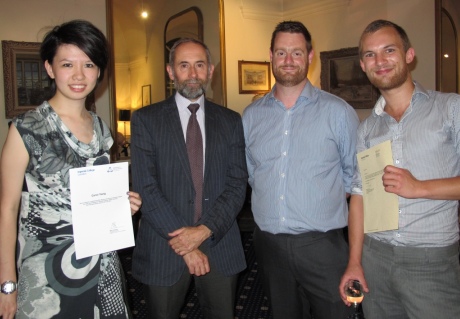Students become the first to complete new physics and teacher training course

This month Carol Yang and Hugo Horlick became the first students to complete a unique degree at Imperial, designed to support classroom physics.
The three-year BSc Physics with Science Education course, run in partnership with Canterbury Christ Church University, is the first degree of its kind in England and Wales. It allows students to acquire a physics degree with the Qualified Teacher Status qualification.
Fully accredited by the Institute of Physics, the course is designed so that students are qualified to teach science at secondary schools in England and Wales without the need for a further postgraduate qualification. It aims to make it easier for Imperial physics students to pursue a career in teaching, at a time when fewer than a fifth of science teachers in UK schools have a physics specialist background.
“I really enjoyed the Communicating Physics course in the second year so for me it was an obvious choice to transfer when the opportunity came up. It was also exciting to be part of a new course."
– Hugo Horlick
Student
The challenging programme covers ninety per cent of the BSc Physics degree. The Science Education element of the programme is provided by Canterbury Christ Church University, which provides modules in educational theory and research. Students are also required to complete 120 days of teaching practice during year three.
Carol decided to take part in the programme after being inspired by her physics teacher at school. Carol said: “I’ve always been interested in teaching. When I was in the sixth form I would help my physics teacher with his year 7 classes. So when I received an email about this new degree, I immediately responded. I thought it was a great idea.”
Carol has secured her first teaching job at a school in London and will start in September.

Left to right: Carol Yang, Professor Richard Thompson (Imperial), Mark Hardman (Canterbury Christ Church University) and Hugo Horlick
Professor Martin McCall, the academic lead on the new degree, said: “The Institute of Physics suggests that 1,000 new specialist physics teachers need to be recruited every year for more than a decade to address the shortfall in science departments across England. We have a long way to go to reach this target. This new programme, along with the outreach work that Imperial’s Department of Physics provides to schools across London seeks to address this and we hope these measures will inspire a new generation of physicists.”
"The partnership between Canterbury Christ Church University and Imperial continues to drive innovation in teacher education, recruiting capable scientists and developing them into the excellent teachers our school pupils deserve."
– Mark Hardman
Canterbury Christ Church University
Mark Hardman, Programme Director for the teaching aspects of the degree commented that: “The partnership between Canterbury Christ Church University and Imperial continues to drive innovation in teacher education, recruiting capable scientists and developing them into the excellent teachers our school pupils deserve. It’s great to see teams across both institutions pull together to ensure the high quality of this unique programme and even better to see what Carol and Hugo can do in the classroom.”
Hugo decided to transfer onto the programme after gaining an insight into teaching. Hugo said: “I really enjoyed the Communicating Physics course in the second year so for me it was an obvious choice to transfer when the opportunity came up. It was also exciting to be part of a new course. When I started the teaching practice I was a little apprehensive about being in front of the class but I found that each lesson got easier and the nerves quickly went away.”
Hugo is currently working as a personal tutor and hopes to take up a teaching position in January.
Imperial students enrolled on a physics undergraduate course (apart from BSc Physics and Music Performance) may formally transfer onto the BSc Physics with Science Education at the end of their second year of study. To be eligible students must have completed the Communicating Physics course in the second year. The undergraduate courses section of the website has more information.
Imperial and Canterbury Christ Church University also host the INSPIRE scheme, a full-time ten month PGCE programme, which places top postgraduate scientists from physics, chemistry or engineering, into classrooms. Working with partner schools in and around London, the scheme combines teacher training in situ with activities that include demonstration lectures, science clubs, master classes, university visits and career talks. To date over 50 students have graduated and are now helping to teach and inspire the next generation of science stars.
Article text (excluding photos or graphics) © Imperial College London.
Photos and graphics subject to third party copyright used with permission or © Imperial College London.
Reporter
Press Office
Communications and Public Affairs
- Email: press.office@imperial.ac.uk
